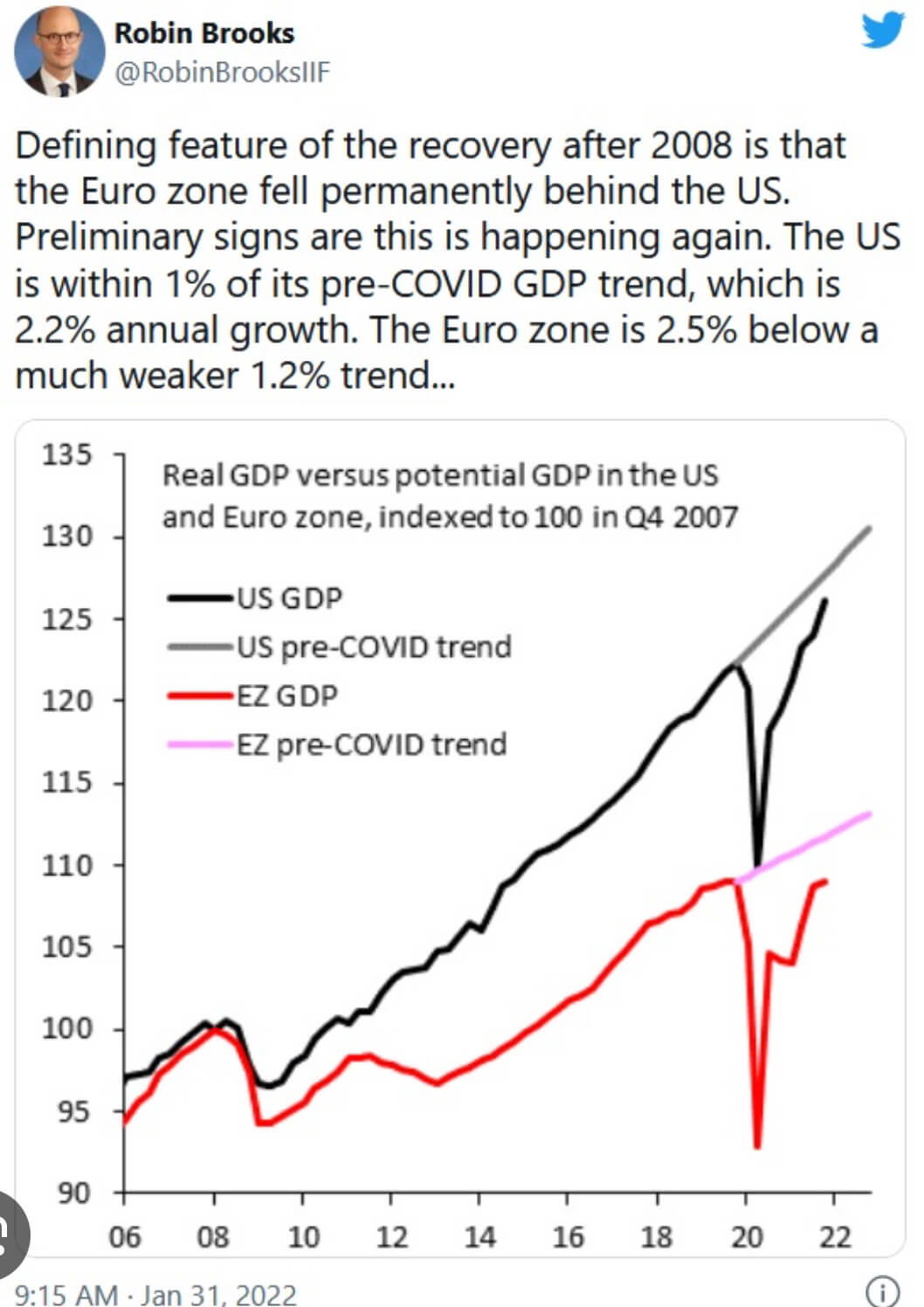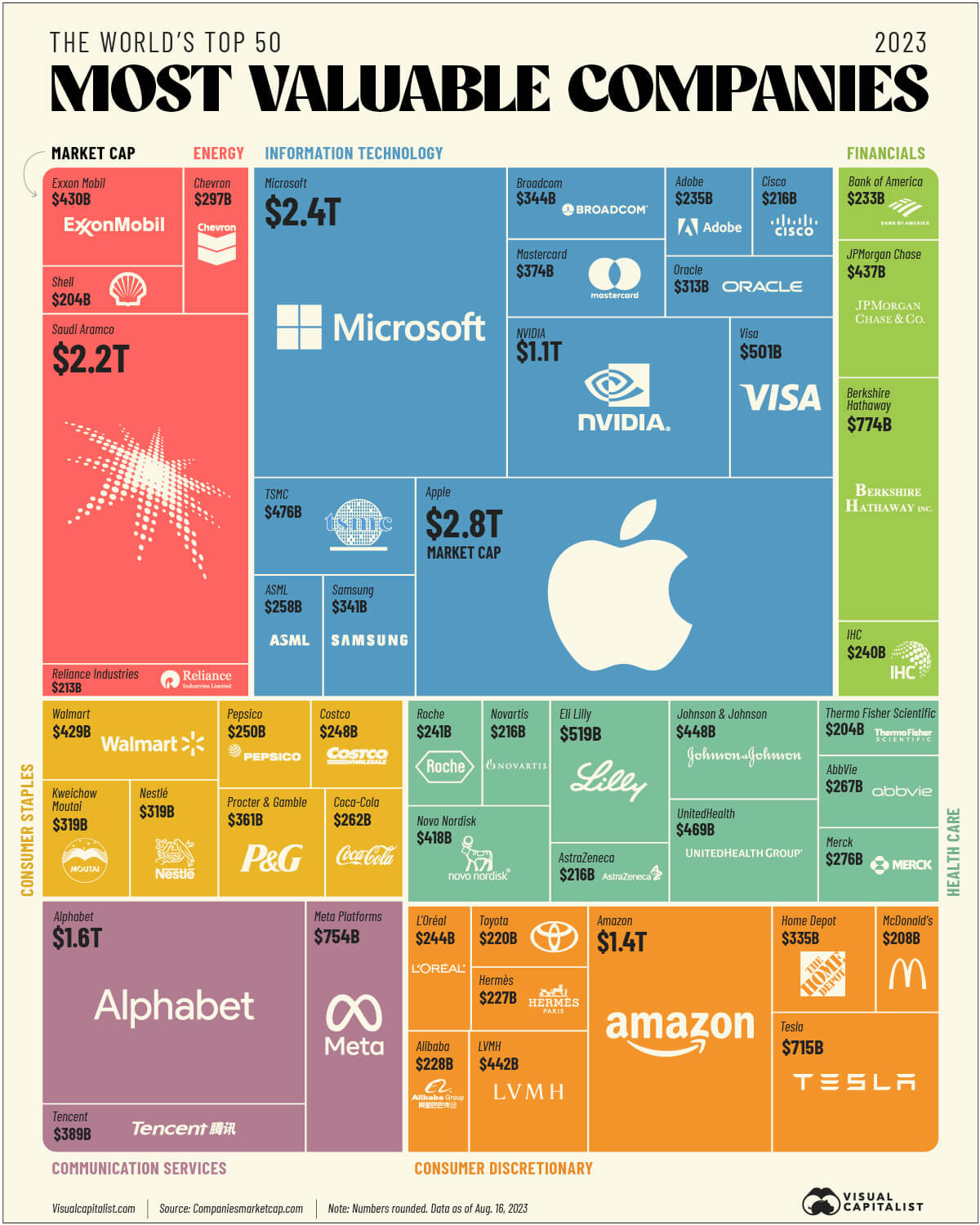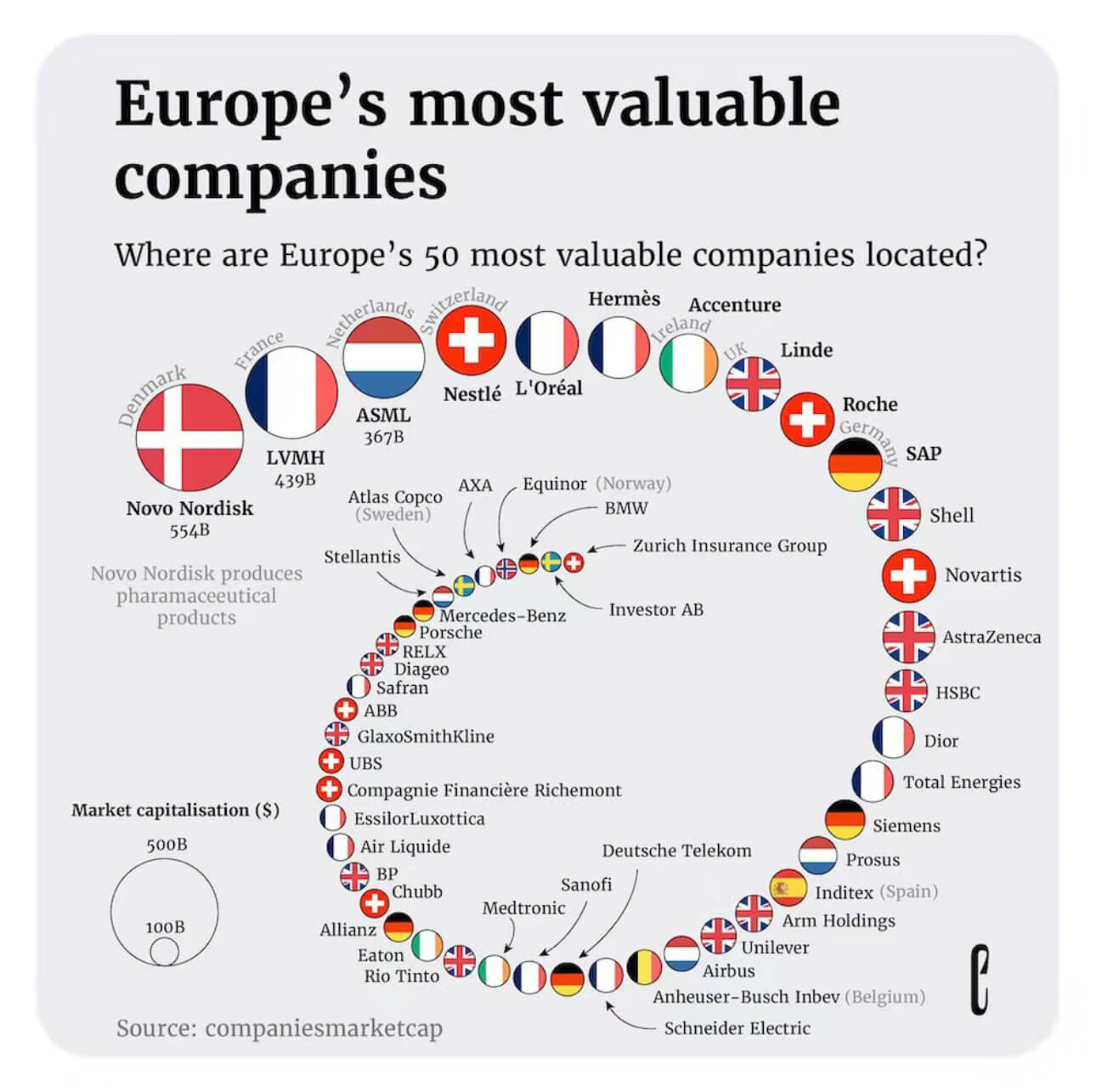Europe is ‘falling behind,’ warns JLL CEO Christian Ulbrich: ‘Our wealth is melting away at rapid speed’ (Source)

There are four core reasons:
1) Financial dominance of US. As a reserve currency, US dollar gives US a huge advantage to lower interest rates, and other advantages. Advantages that Europe doesn’t have.
2) Energy – US has substantial energy reserves. The war in Ukraine and limiting Russian oil has limited supply for Europe’s energy and raised prices. At the same time it has forced Europe to buy gas from US. Which also benefits US. In 2023, the United States was the largest LNG supplier to the EU, representing almost 50% of total LNG imports. In 2023, comparing to 2021, imports from the US almost tripled. More details here.
3) Falling Behind in Technology – as I will discuss in this article.
4) Economy – an over-reliance on GDP which actually is not an effective measure of economic growth, and causes short term. With something as important as measuring economic activity, we should have a more accurate, and multiple measurements of economic activity, for example: birth rate.
I wrote some ideas for this here.
Europe’s leaders should acknowledge that their continent is no longer an economic juggernaut that can bend the world to its will. “Europe is just a small proportion of the world population, a shrinking proportion of world GDP, and we are in competition with the whole world,” according to JLL CEO Ulrich.
Europe’s problems largely come down to an overbearing bureaucracy that differs from country to country; mismanagement of talent and immigration; and a chronic underinvestment in energy. Those causes are all preventable, but they do require taking a hard look in the mirror.
And in its rule-making, the EU should simplify and streamline, rather than moralize and nitpick. “All the rules and moral expectations are adding to the cost of doing business,” Ulbrich said. “Europe has an overly-accentuated bureaucracy that wants to implement rules that no one in the world is following.”
In this time we have had huge technology advancements which should have made our ability to work far more efficient. We have phones, fast computers, and a massively increased ability to communicate. But why hasn’t this growth translated into a faster than 1.2% growth trend?
In a world where the most valuable companies in the world are now technology companies.
Why are none of the top 10 world’s most valuable tech companies from Europe?


When most of the world’s largest, and fastest growing, companies are technology companies.
Why are only a very small number of Europe’s most valuable companies technology companies?

Why is developing the tech industry important for Europe?
It’s incredibly important because technology is the industry of the future. That is where so much of the growth is happening. Technology is eating the world. Imagine if the industrial revolution didn’t happen in Europe. It would fall far behind forever.
I see the development of technology as being similar to the industrial revolution and US is building technology companies at the same pace that Britain developed it’s navy.
Technology and technology companies right now is the infrastructure to the future economy. It is the equivalent to what building a navy was like for Britain were to the British empire.
Historical Parallel with the Industrial Revolution
- Foundation for Economic Dominance: The Industrial Revolution, which began in Europe, particularly Britain, in the late 18th century, was a pivotal moment in history. It shifted economies from agrarian-based to industrial and manufacturing-based, leading to unprecedented economic growth and establishing Europe as a dominant economic power. Missing out on leading the Industrial Revolution would have left Europe economically and politically marginalized. Similarly, leading in today’s technology revolution is essential for maintaining economic dominance and geopolitical influence.
- Catalyst for Societal Transformation: Just as the Industrial Revolution radically altered societies, the technology revolution is reshaping the way we live, work, and interact. It’s driving advancements in communication, transportation, healthcare, education, and more. Being a leader in technology means shaping these societal changes in ways that align with European values and priorities, such as privacy, inclusivity, and sustainability.
The Imperative of Leading in Technology
- Economic Growth and Job Creation: The technology sector is a major engine of economic growth and job creation. It’s not just about the tech companies themselves but also about the broader ecosystem of suppliers, service providers, and related industries they support. Europe’s ability to cultivate a thriving tech industry is crucial for its future prosperity and for providing high-quality jobs to its citizens.
- Innovation and Competitiveness: Technology is the cornerstone of modern innovation, driving progress in fields as diverse as artificial intelligence, renewable energy, biotechnology, and digital services. Europe’s capacity to innovate within these and other tech domains is critical for its competitiveness. By leading in technology, Europe can set global standards and ensure that its industries remain competitive on the world stage.
- Strategic Independence and Security: Reliance on non-European tech giants and infrastructures poses risks to Europe’s strategic independence and security. Developing a robust domestic tech industry allows Europe to secure its digital infrastructure, protect sensitive data, and maintain sovereignty over its technological future. This is analogous to how control over industrial resources and capabilities was a strategic asset during the Industrial Revolution.
- Addressing Global Challenges: From climate change to public health, technology offers solutions to some of the world’s most pressing challenges. Europe’s leadership in technology not only positions it as a global problem-solver but also as a moral and ethical leader, promoting technologies that are sustainable, equitable, and beneficial for society at large.
In conclusion, just as the Industrial Revolution laid the groundwork for centuries of economic and political dominance by those who led it, the technology revolution offers a similar inflection point. For Europe, being at the forefront of this revolution is not just about economic growth; it’s about shaping the future of society, maintaining strategic autonomy, and playing a central role in addressing global challenges. The stakes could not be higher, and the urgency for Europe to not just participate but lead in the technology industry is a matter of securing its position and influence in the future world order.
Why hasn’t Europe’s technology sector developed?
- Fragmented Markets – Multiple small markets, with different languages –
- it’s harder to localise and reach scale, compared to USA or China.
- Therefore there is a less developed ecosystem and capital and returns.
- This also means that the market is fragmented. Tech hubs are regional rather than continental – located in the capitals of each country, which means there is less likely to be bigger tech hubs.
- Immigration
- The Largest American Companies and Their Immigrant Roots,” found that 44.8% of Fortune 500 companies were started by immigrants or their children. The report, titled “New American Fortune 500 in 2023:
- Regulation
– Europe is known for its stringent regulatory environment, including labor laws and privacy regulations like the General Data Protection Regulation (GDPR). While these regulations protect workers and consumers, they can also impose additional burdens on startups and tech companies, making it more challenging to rapidly innovate and scale. - Risk aversion
Cultural attitudes towards entrepreneurship and failure can be more conservative in Europe than in places like the United States. A greater stigma associated with failure and a more risk-averse approach to entrepreneurship can limit the number and ambition of technology startups. - Developed industries – existing industries such as finance, manufacturing, may “take” the talent that might otherwise go into tech.
- Brain Drain – many of the smartest entrepreneurs from Europe might move to US for higher paying salaries.
- US Domination
- By nature of tech is that it’s about speed. US has significant advantages, which means that tech companies in US might be able to reach scale faster, and then just flood the European market. This cycle repeats on each successive wave of innovation, never giving Europe a chance to develop by itself.
How can Europe develop it’s technology sector?
Parallels with Building a Navy in 16th century
Drawing on parallels between building out the technology industry in 2024 and building out the navy in 16th and 17th century. I’m not saying anything about morals about that period. I’m just saying that building ships was essential for Britain to become the worlds leading power, and that there are similarities between that and technology now.
Let’s look at what happened then:
Britain’s development into a world naval power began in the late 16th and early 17th centuries, with significant acceleration during the 18th century, a period often referred to as the “Age of Sail.” The foundation for Britain’s naval dominance was laid during the reign of Elizabeth I, particularly with the defeat of the Spanish Armada in 1588, which marked the emergence of England (later Britain, following the 1707 Act of Union with Scotland) as a formidable maritime power.
However, it was during the 18th century that Britain’s Royal Navy truly established itself as the world’s preeminent naval force. This era saw a series of conflicts, including the War of Spanish Succession (1701-1714), the War of Austrian Succession (1740-1748), the Seven Years’ War (1756-1763), and the Napoleonic Wars (1803-1815), during which the Royal Navy played a critical role in expanding and protecting the British Empire’s interests across the globe.
Key developments during this period included:
- Technological Advancements: Innovations in ship design, navigation, and gunnery improved the performance and effectiveness of the Royal Navy’s fleet.
- Professionalization: The 18th century saw efforts to professionalize the navy, with formal training for officers, improvements in discipline and living conditions for sailors, and better administrative practices.
- Naval Dockyards: The expansion and modernization of naval dockyards, both in Britain and overseas, enabled the maintenance and construction of a large fleet capable of projecting power globally.
- Global Network of Bases: Britain established a network of strategic naval bases and coaling stations around the world, facilitating global reach and the ability to sustain naval operations far from home waters.
By the end of the Napoleonic Wars in 1815, the Royal Navy had secured its status as the world’s dominant naval force, a position it would maintain well into the 20th century. This naval supremacy was crucial for protecting trade routes, colonizing new territories, and maintaining the British Empire’s interests against rival powers.
Here are some ideas:
1 – Make English the lingua franca official language of europe – as suggested by Lee Kuan Yew, and Ulrich.
2 – Massive technology education for younger children to give an advantage and make them more technically literate, to build the best workforces
3 – Focus and protect certain industries and enable local versions to develop, eg., ecommerce, VR, drones, just choose a few of those to become world experts in and invest in them, have a focused approach considering what are some of Europes existing advantages
4 – Foster innovation clusters – the equivalent of “dockyards” – special economic or technology zones with tax incentives, eg., aim to build one or two technology “singapore, or dubai” in europe for 50-100 years.
5 -Government investment and subsidies – similar to infrastructure, car and finance industries
6 – Attract talented immigrants – make it a place for young people to want to move to to start companies – reduce tax rates for younger people
7 – Reduce regulation – to enable more innovation to happen
8 – Encourage entrepreneurship
More resources
